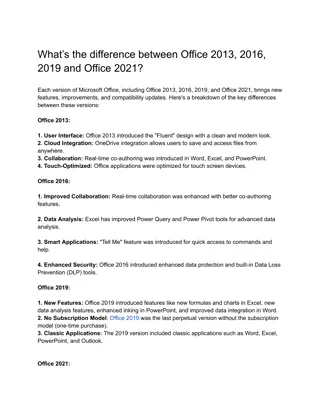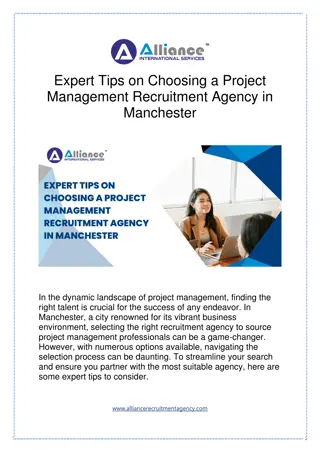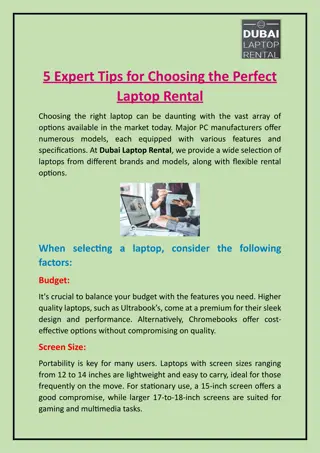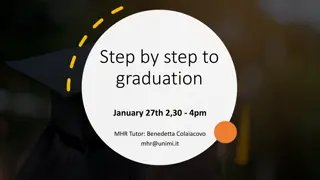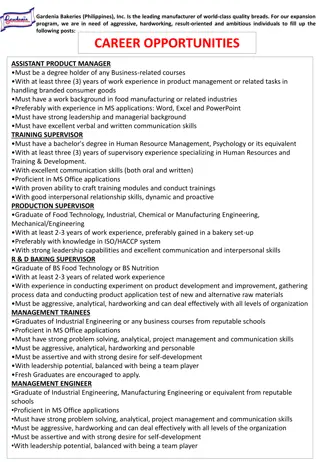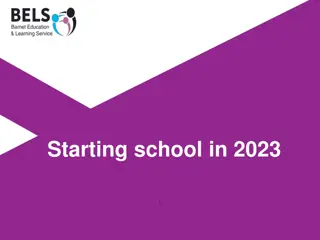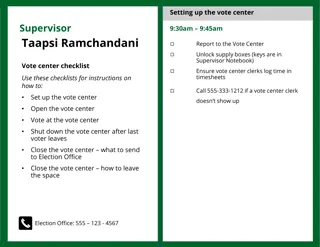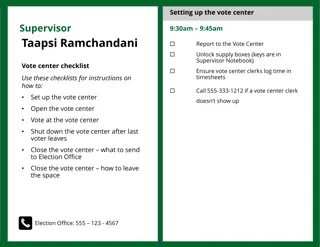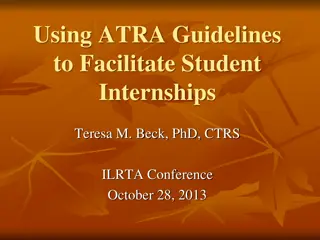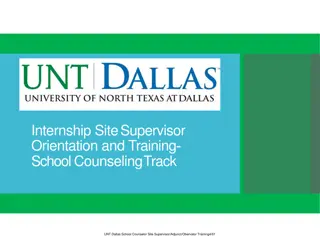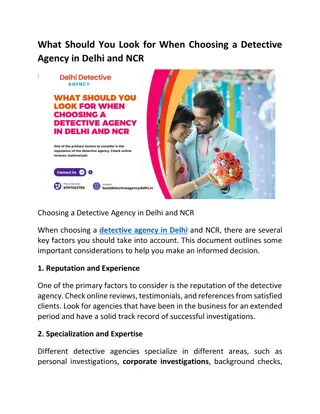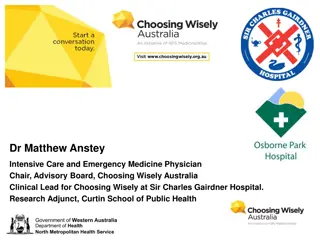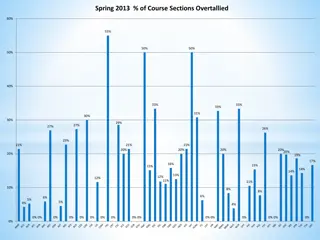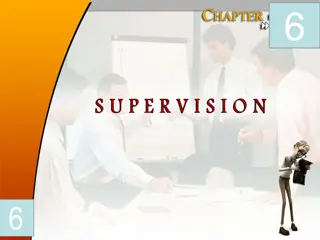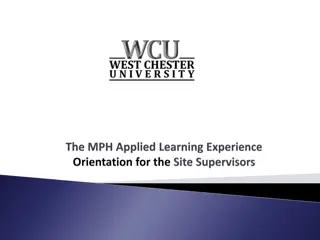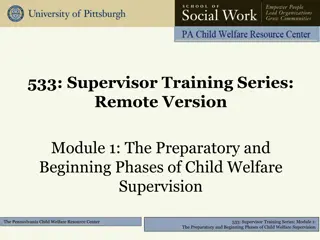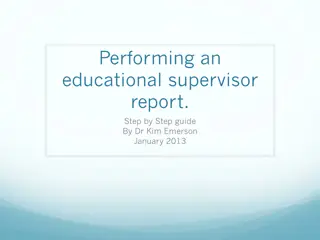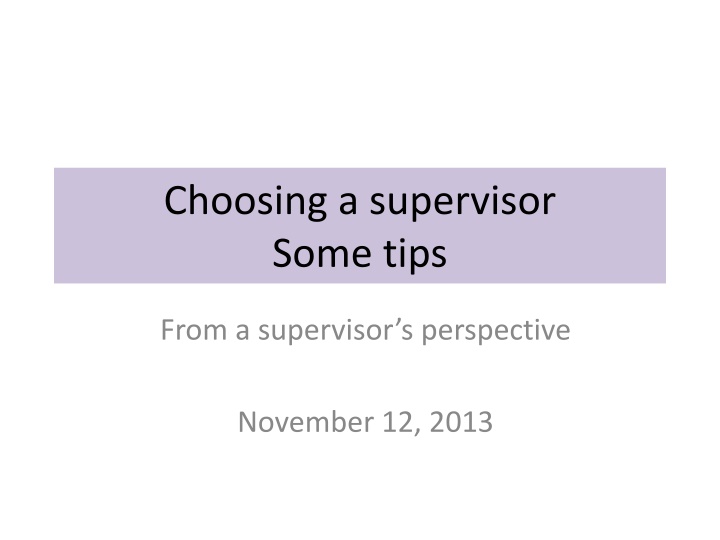
Effective Tips for Choosing a Supervisor in Academic Research
Discover expert tips on selecting the right supervisor for your academic research journey. Learn the importance of thorough research, forming beneficial relationships, and navigating unique student-supervisor dynamics for success in your studies.
Download Presentation

Please find below an Image/Link to download the presentation.
The content on the website is provided AS IS for your information and personal use only. It may not be sold, licensed, or shared on other websites without obtaining consent from the author. If you encounter any issues during the download, it is possible that the publisher has removed the file from their server.
You are allowed to download the files provided on this website for personal or commercial use, subject to the condition that they are used lawfully. All files are the property of their respective owners.
The content on the website is provided AS IS for your information and personal use only. It may not be sold, licensed, or shared on other websites without obtaining consent from the author.
E N D
Presentation Transcript
Choosing a supervisor Some tips From a supervisor s perspective November 12, 2013
Disclosure I chose thesis supervisors for my MSc and my PhD I changed my PhD thesis supervisor and dropped the thesis topic chosen by him I found the topic for both my MSc and PhD research My primary PhD supervisor left McGill and I had to work with a new co-supervisor (first time supervisor) as well as my original supervisor (long distance from California) I survived to tell the tale!
Suggestion Put at least as much time into researching and choosing an appropriate supervisor as you would into buying a car
Tips Tip 1. Browse before deciding Tip 2. Get your paperwork in order Tip 3. Don t talk financing or trade-ins until you ve settled on a price Tip 4. Don t fail the test drive
Remember You are not imposing on faculty members when you meet with them as potential supervisors If you get that impression then that is the wrong person for you! You will be helping the faculty member study an area in which s/he is interested You should be an asset to their team The faculty member will gain credit for training you This should be a mutually beneficial relationship
And Each student-supervisor relationship is unique Even within a team the model may differ across students Some very successful ones are quite informal and distant; others are close and dynamic One type of supervisor does not fit all!
Early Steps Get to know who is who in the Department Go to seminars Come up with a short list of potential supervisors Check out webpages Check out publications of potential supervisor(s) and students Check out grants (CIHR webpage ) Speak to current and previous students Not only will you get info on the proposed supervisor but you will also get an idea if there is a team feeling or lone workers Time to completion is something that you might look into as well Check the supervisory privileges of your potential supervisor
The Approach Be sure to distinguish between preliminary, exploratory approaches and the actual request to become one's supervisor Send an introductory email with a nicely prepared academic CV Do not be too rigid in your area of interest at this point Once the date is set, ask to read grant applications or other documents as background Be Professional on time, and prepared What are your areas of interest etc . Ask about RA opportunities
Things to Discuss Your goal is to find out more about the faculty member and opportunities for research while at the same time impressing them Mention your career goals What are your personal work and learning styles? What are your timeframes for thesis completion? How will these fit with potential thesis supervisor? Are there funding opportunities? What are they? What careers have previous students gone onto?
The Decision Go back to your first choice and ask . Make sure to call back each person you met with to tell her/him whether or not you want to work with her/him It is not a problem to tell her/him you decided to work for someone else The faculty member knows you are making a choice
Some additional thoughts Even if you do not choose a particular faculty member that you met with, you can still interact with them There should be no hard feelings on either side There are many reasons that a faculty member may say no after meeting with you that are not a reflection you No enough funding available, going on sabbatical, too many current students, not quite the right fit for the available project A professor may ask you first Don t answer too quickly Still go through the process carefully.
The First Meeting DO Discuss expectations on both sides! Prepare an agenda share it with your supervisor in advance Listen Supervisor expectations of you Ask questions for clarification You need to ask them now because it might be too late if there is a misunderstanding Confirm previous discussions about funding Frequency and format of meetings Presentations, free flow, ., email, teleconference, videoconference Prepare an agenda Follow up with notes DON T define too many parameters in advance No supervisor wants to be interrogated DO Tell your supervisor now if you have any specific constraints or expectations I will be leaving to spend 6 months in France Relationships evolve let that happen
Some More Tips Be flexible in your expectations for a thesis topic Too rigid might turn off a supervisor not working in that area Seek to make the research your own this is not merely a big assignment it is YOUR research Look for opportunities to put your stamp on the project
TIP: Familiarize Yourself with Departmental Procedures Primary supervisor MUST be a faculty member in the EBOH Nomination of supervisor, committee forms Deadlines Tracking Forms Timelines for your degree Ask questions if you are confused Program Advisor Do not assume that your supervisor will have all the answers
Manuscript-Based Thesis Potential Benefits Better positioning for future career (postdoctoral fellowships or jobs), Gaining publishing experience something every academic needs, Potentially increasing research efficiency, Potentially leading to more practical and useable results, Allowing greater depth, breadth and comprehensiveness, Opportunities for real life learning (manuscript preparation, submission process, peer review, etc.), and Undergoing a more rigorous process in preparing results for publication than for a traditional thesis (monograph), with the resulting thesis potentially being high quality. Potential Challenges Working within uncertain timelines Developing a thesis that is coherent Structuring and formatting, as there maybe very different audiences and purposes for the various papers A longer time commitment may be required because: Publication process takes time Circumstances may change while completing the research preparing the thesis, e.g. Unfavorable results of a review; Unexpected (or null) study results. Inclusion of others (reviewers/editors) into the research process Publishing work early on that may not reflect your level of sophistication at the end of your thesis



